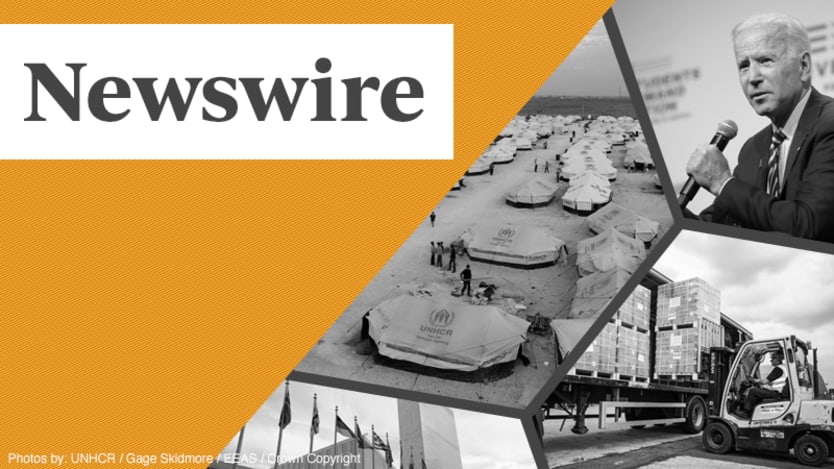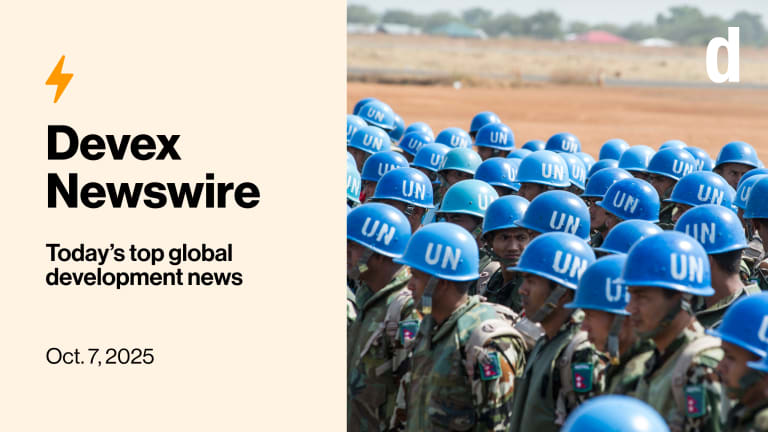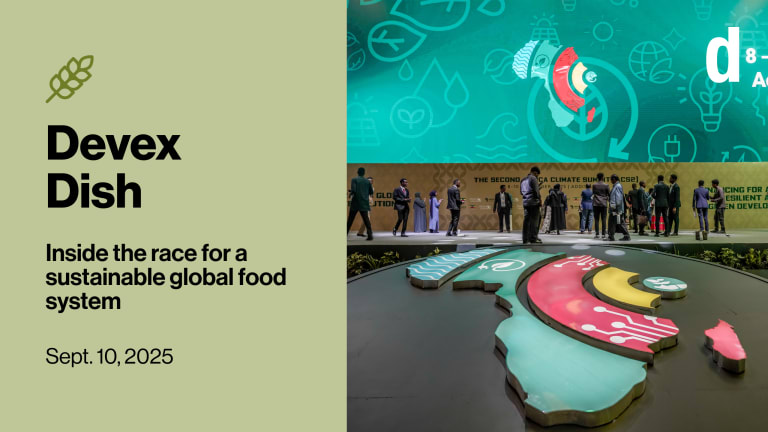
In Haiti, imported rice costs between $600 and $900 per ton, while local rice can cost between $1,300 and $2,000 per ton. Relief efforts face a trade-off between helping more people and supporting local production.
This is a preview of Newswire
Sign up to this newsletter for an inside look at the biggest stories in global development, in your inbox daily.
My colleague Teresa Welsh traveled to Les Cayes to understand how — after years of repeated disaster, reconstruction, and investment — the country’s food system remains trapped in a cycle of unreliability and dependence.
Teresa digs into that question in this multimedia feature. The answer, unsurprisingly, is complicated and multifaceted.
After a 7.2 magnitude earthquake struck the Caribbean nation on Aug. 14, the nonprofit Hope for Haiti scrambled to collect shelf-stable food products it could distribute to people in need. Weeks later those goods were still piled in a former conference room under tarps because the bags needed to package them were blocked by gang activity on the road from Port-au-Prince.
The World Food Programme tries to buy locally grown crops for the food aid it prepositions to speed up disaster recovery efforts, but Haiti’s crops often fail to meet WFP’s quality standards. When aid groups are able to make purchases locally, Haiti’s roads are often either insecure or impassable.
“There’s a trade-off between how many people do you want to help and how do you want to help them,” says Marc-André Prost, WFP’s deputy country director for Haiti.
Read the visual story: Why Haiti's food system is so hard to fix
Devex Pro: Seed access woes prevent growth of Haitian agriculture
Ups and downs
According to the United Kingdom’s Chancellor of the Exchequer Rishi Sunak, the government’s foreign aid budget is “scheduled” to return to 0.7% of gross national income by 2024-25. That’s good news … right?
Not so much, reports Will Worley. Aid experts say that the long timeline for returning to what was once the law of the land, along with the current government’s policy of treating 0.5% as a ceiling for aid spending, means that things could get worse before they get better for U.K. development funding.
“It now looks certain that the Treasury will use accountancy trickery … There will be even less funding for humanitarian and development programmes and potentially a third round of cuts to life-saving work,” says Stephanie Draper, chief executive at Bond.
Read: UK's 0.7% aid target 'scheduled' to return, but more cuts feared first
+ Pro subscribers can catch up on how FCDO has fared in its first year.
Make or break
Climate finance is hoping for a moment as COP 26 kicks off Sunday. One institution that could play a bigger role in channeling resources to climate projects is the Adaptation Fund. Its reliance on voluntary donations has made predictable funding hard to come by, but a multiyear agreement signed with Sweden in 2019 could offer a model for other countries to follow.
Devex Pro: The Adaptation Fund’s climate finance quest
+ Pro subscribers can read up on how climate finance can be effective and inclusive of local communities. Not yet a Pro subscriber? Gain access to deeper analysis of the development sector by signing up for a 15-day free trial.
Cutting back
On Wednesday, Mercy Corps announced a commitment to halve its carbon footprint by 2030. The pledge applies to “all of the activities undertaken to run its global programs.”
Mercy Corps’ announcement comes alongside an eight-month investigation by The New Humanitarian into the aid sector’s carbon footprint. For many of the organizations surveyed, air travel was one of the biggest contributors to emissions.
+ From the archives: When development conferences cost the Earth
Short supply
Supply challenges — not funding — are the main reasons why COVAX is not expected to meet its initial target of delivering 2 billion vaccine doses to its participating countries, according to an analysis by the United States Government Accountability Office.
As of Sept. 15, UNICEF data showed that the vaccine sharing platform was still 1.7 billion doses — about 86% — short of this goal, which it now hopes to achieve in early 2022.
ICYMI: More transparency needed on COVID-19 vaccines
+ For more content like this, sign up for Devex CheckUp, the must-read weekly newsletter for exclusive global health news and insider insights.
Natural capital
“Environmentally harmful produced capital and fossil fuels are often overrewarded by markets, while essential human and renewable natural assets are often undervalued and underpriced.”
— The Changing Wealth of Nations 2021, a World Bank reportMany nations are on an “unsustainable development path,” focusing too heavily on short-run gains, according to a new World Bank report.
Read: Global wealth is increasingly unequal, says World Bank report
Fossil fuel
To drive home the urgency of the climate crisis, the United Nations has enlisted a new spokesperson: a CGI dinosaur voiced by actor Jack Black.
In other news
A ransomware attack on Papua New Guinea's finance ministry last week locked it out of access to hundreds of millions in aid money. [Bloomberg]
The World Bank and the African Union have suspended aid to Sudan in response to Monday's military coup. [BBC]
An Indigenous group is suing the Australian government for climate inaction, the first lawsuit of its kind brought by First Nations people. [CNN]
Sign up to Newswire for an inside look at the biggest stories in global development.
Search for articles
Most Read
- 1
- 2
- 3
- 4
- 5








